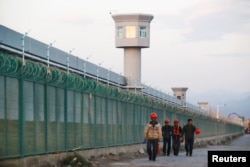Officials from China’s northwestern Xinjiang area said Tuesday that most of the people detained in so-called re-education camps have been released. The officials also said many had signed work agreements with Chinese businesses.
Family members of detainees, however, say their relatives remain missing.
Xinjiang is home to about 12 million Uyghurs, Kazakhs and other Muslim ethnic minority groups.
Human rights groups and independent experts estimate that between 1 and 3 million Muslims have been detained in Xinjiang’s heavily guarded camps since 2017. Among them are well-known Uyghur cultural leaders, professors, musicians and writers.
The Chinese government describes the camps as work training centers. But former detainees and their family members say the camps are like prisons.
Shohrat Zakir is Xinjiang’s governor. He told reporters Tuesday that the camps are an effective and “pioneering” way to fight terrorism. He said most of the so-called “graduates” of the camps have re-entered society, and that 90 percent of them have found good jobs.
Former camp detainees have told reporters with The Associated Press that they were not told why they had been detained. They said they were forced to deny their religion and instead swear loyalty to China’s ruling Communist Party. They also described abusive treatment.
Foreign reporters who have visited Xinjiang have published images of large, prison-like complexes surrounded by sharp wire and watchtowers.
Xinjiang Vice Chairman Alken Tuniaz said Tuesday that stories about people being treated poorly in the camps are untrue. He also said the camps protect people’s freedom by permitting them to “request time off” and “regularly go home.”
Tuniaz added that although people inside the camps are not permitted to observe their religion, they can continue with religious activities once they return home.
The officials did not say whether the program is voluntary or how often people are permitted to go home.
Also on Tuesday, the foreign minister of Turkey said his country will send an observation group to Xinjiang. The foreign minister said he made the decision after discussing the Uyghur situation with China’s foreign minister.
The Uyghurs are a Turkic people. Their language and culture are closely related to Turkish. Turkey is so far the only Muslim country that has regularly expressed concerns over China’s treatment of Uyghurs.
Earlier this month, U.S. Secretary of State Mike Pompeo sharply criticized China’s actions in Xinjiang. He called China’s treatment of Uyghurs the “stain of the century.”
China rejects accusations that it is violating religious or human rights in Xinjiang.
I’m Ashley Thompson.
The Associated Press and the Reuters News Agency reported this story. Susan Shand adapted it for VOA Learning English. Ashley Thompson was the editor.
Write to us in the Comments Section or on our Facebook page.
_______________________________________________________________
Words in This Story
pioneering – adj. courageous and new
regular – adj. doing something often
watchtower – n. a tall structure that is used by a person who guards or watches a place
graduate – n. one who has finished an education course
stain – n. a mark made on a surface, a piece of clothing, etc., that is very hard or impossible to remove






